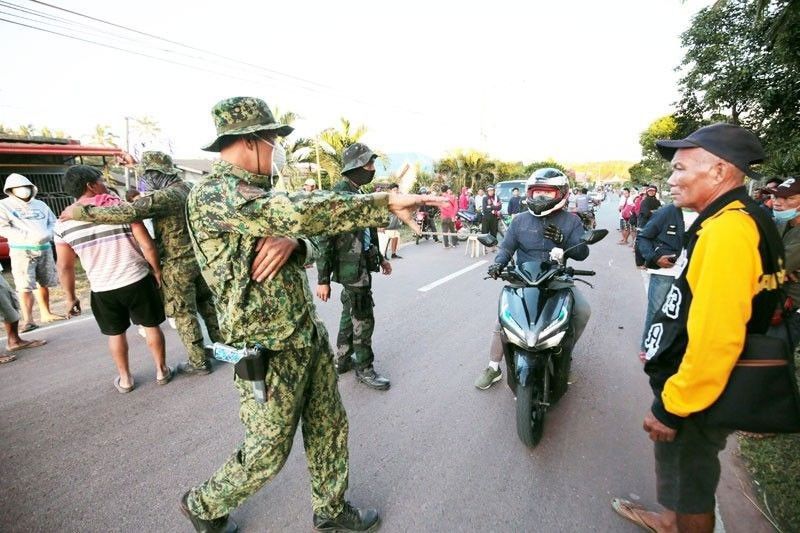Lockdown lifted in more areas; Taal alert 3 remains

MANILA, Philippines — The lockdown in most towns around the restive Taal Volcano has been lifted, with only 10 barangays in five lakeshore communities still closed to the public due to the remaining threat of hazardous eruption despite the lowered alert level.
Brig. General Marceliano Teofilo, commander of Joint Task Force Taal, said yesterday three barangays in Talisay; two each in Agoncillo, Laurel and San Nicolas and one in Balete remain on lockdown as they are within the seven-kilometer danger zone under a Level 3 alert.
He said the military has shifted its attention to the rehabilitation process, including helping displaced residents return to their houses.
Still on lockdown are Barangays Banyaga, Bilibinwang in Agoncillo; Bugaan East, Buso-buso and Gulod in Laurel; Buco, Sitio Tabla, San Isidro of Poblacion 6 in Talisay; Alas-as and Pulang-Bato in San Nicolas; and Calawit in Balete.
In a bulletin released by the office of Batangas Gov. Hermilando Mandanas, lockdown in Agoncillo and Laurel has been lifted in the wake of the lowering of alert level. Residents of the two towns have been allowed to return, but not to barangays within the seven-kilometer danger zone set by the Philippine Institute of Volcanology and Seismology (Phivolcs).
Agoncillo Mayor Daniel Reyes, in a phone interview, said many of his constituents had started cleaning their houses and feeding their animals. He said they need the help of the Department of Public Works and Highways in rebuilding damaged infrastructure and clearing roads.
Despite the lower alert level, Phivolcs has advised residents within Taal Volcano’s 14-kilometer danger zone to remain vigilant and ready for possible evacuation.
Science Undersecretary and Phivolcs director Renato Solidum Jr. said Alert Level 3 means that sudden steam-driven and even weak phreatomagmatic explosions – similar to the Jan. 12 and 13 events – as well as volcanic earthquakes, ashfall and lethal volcanic gas expulsions can still occur and threaten areas within the volcano island and nearby lakeshore towns.
“The LGUs (local government units) must implement early and quick evacuation should the volcano show signs of renewed activity,” Solidum said in a television interview.
In the past 24 hours, 170 volcanic earthquakes have been recorded by the Taal Volcano Network, four of which were low-frequency ones.
“There were some low-frequency earthquakes recorded which indicate that there’s still ongoing activity beneath the volcano,” Solidum said.
The sulfur dioxide emission, on the other hand, has dropped to an average of 87 tons per day – much lower than the 5,299 tons recorded on Jan. 13.
Sulfur dioxide emission indicates an upward movement of magma toward the surface of the volcano.
Solidum said they would observe Taal’s activity for two more weeks before they decide if there would be any need to adjust the current status.
On Sunday, Phivolcs lowered the alert level of Taal to 3, on account of “decreased tendency towards hazardous eruption.”
“Our stand down procedure in lowering the alert (level of volcanoes) is two-week observation. It can be shortened if we see the downward trend of monitored parameters is very definite,” he said.
On standby
The Department of the Interior and Local Government (DILG) has directed concerned local government units to take precautionary measures and not to let their guard down despite the lower alert level.
“According to Phivolcs, even with the lowering of the alert level we should not be complacent,” Interior Secretary Eduardo Año said in Filipino.
“The crisis is not over. It’s over when there is no longer any alert level,” he said.
The national government has presented proposals to have a 14-km permanent danger zone around Volcano Island.
A total of 102,443 families have been affected by the Taal eruption, with over P3.3 billion worth of damage to infrastructure and agriculture tallied in three provinces.
The DILG chief also ordered units from the Philippine National Police and Bureau of Fire Protection (BFP) to be always on alert for emergency situations, including mass evacuation of communities around the volcano.
The Philippine Coast Guard (PCG), for its part, has begun installing 49 buoys around the volcano to mark the seven-kilometer danger zone.
PCG Batangas Task Force commander Commodore Artemio Abu said they are measuring the depth of Taal Lake in preparation for the installation of the buoys.
“Beyond the seven-kilometer danger zone they could already play around. But the people should remember that the risk is still there, so they are going there at their own risk,” he said.
“We have not yet reduced the number of our personnel but we would make a study on that. Some of my men have told me that some of the evacuation centers were already empty, but I said that we should stay at our Batangas station while waiting for further instructions,” Abu added.
Meanwhile, students in areas affected by the Taal Volcano eruption will have to go to school on weekends to make up for class suspensions, according to the proposed modified school calendar of the Department of Education (DepEd).
There will be 60 school days from Feb. 3, the date of the resumption of classes, to April 6.
Under the modified calendar, there will be Saturday classes in the remaining 10 weeks of the school year. Students will also have to go to school on Saturday and Sunday in April.
“In response to queries if we can have our children graduate even without the classes, we have replied that they have to comply with the requirements, because this is a requirement of law,” Education Secretary Leonor Briones said at a press briefing yesterday in Malacañang.
“We hope that we will be able to complete the required number of school days face-to-face interaction by April,” she added. – With Arnell Ozaeta, Romina Cabrera, Evelyn Macairan, Alexis Romero, Rainier Allan Ronda
- Latest
- Trending

































